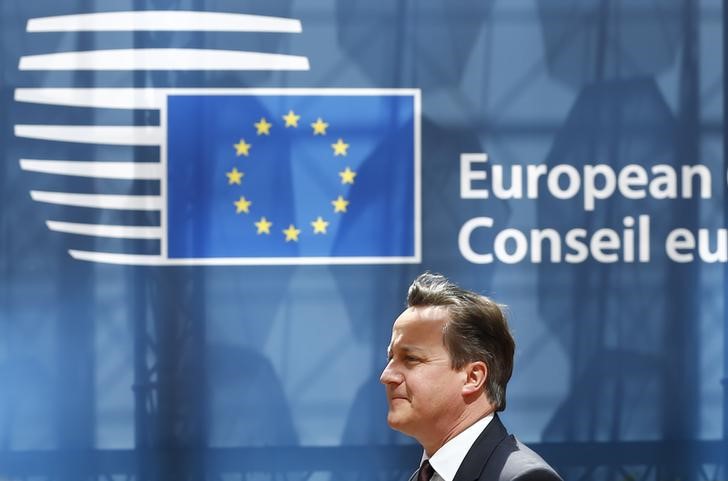By Guy Faulconbridge and Alastair Macdonald
BRUSSELS (Reuters) - Prime Minister David Cameron told European Union leaders on Thursday he needed a new deal to keep Britain as a member, opening a struggle over the bloc's future at a summit preoccupied with keeping Greece from crashing out.
Freshly re-elected last month, Cameron faces difficult negotiations if he is to persuade other EU members to accept new terms for the United Kingdom before a referendum by the end of 2017 on whether Britain will stay or go.
Cameron, who leads a Conservative Party divided for decades over Europe, says he supports remaining in a reformed EU, but would not be heartbroken to leave.
He is seeking to limit welfare benefits for migrants from other EU states, as well as guarantees that Britain, home to Europe's main financial centre, can opt out of rules made by the members of the euro, which Britain says it will never join.
Cameron is due to set out his intentions at dinner with other EU leaders in Brussels, though one official said the pitch might be relegated to dessert as the prospect of Greece defaulting on debts next week eclipses all other risks.
"Today marks a significant milestone really in the process of saying that it is right to have this renegotiation and this referendum," Cameron said on arrival in Brussels.
"The British people have the final say about whether we stay in a reformed European Union or leave."
The summit marks the formal start of Britain's latest renegotiation of its ties with Europe, the world's largest economic bloc, though Cameron is expected only to give a brief outline of his vision.
On the eve of the meeting, Queen Elizabeth urged Europe to guard against division in the continent, at a state banquet in Berlin where Germany's president declared: "the European Union needs Great Britain".
Leaving the European Union was once considered far fetched: two decades ago, British politicians were arguing about whether to join the euro and talk of an exit was the reserve of sceptics on the fringes of both major British parties.
But under pressure from Conservative Eurosceptics and from the rise of the anti-EU UKIP party during his first term as prime minister, Cameron promised in 2013 to hold a referendum if he were re-elected.
A referendum vote to stay in Europe would remove a divisive issue from the table, but the run-up to a vote risks opening fissures within the party that helped bring down his Conservative predecessors John Major and Margaret Thatcher.
EU leaders including Germany's Angela Merkel want to keep the EU's second-largest economy inside the bloc. But there is frustration in many European capitals that Britain appears ambivalent towards its EU membership and keeps trying to haggle over the rules.
"There are some British concerns that we should consider but only in a way which will be safe for all Europe," European Council President Donald Tusk said. "The fundamental values of the European Union are not for sale and so are non-negotiable."
CAMERON'S GAMBLE
Cameron has met almost all of the EU's 27 other leaders since the May 7 election to explain his plans.
EU leaders will likely note his intentions, a step that allows officials to begin to discuss details.
In his election manifesto, Cameron said he would limit benefits for migrants from other EU states, win guarantees that the euro zone will not impose rules on non-euro members, promote more aggressive foreign trade deals and seek reforms to deepen the single market.
Cameron has been advised that some limits on migrant benefits may require changes to the EU's treaties. Since that would take years, he may have to settle for a promise to change rules in the future.
Conceding the scale of the task, two British government sources said Cameron would demand the promise of treaty change but that the changes may not be fully ratified by the time of the referendum.
"It doesn't add up to a row of beans does it? It is meaningless," Nigel Farage, leader of the UK Independence Party, said of Cameron's renegotiation. "This idea of asking for a promissory note just won't be good enough."
Business chiefs from companies including BT (L:BT) and easyJet (L:EZJ) called on Cameron to keep Britain in the EU, saying it was better to reform the EU from the inside.
In a sign of Brussels gearing up to deal with Cameron's demands, Jean-Claude Juncker, head of the executive European Commission, appointed one of the most senior Britons in the EU civil service, Jonathan Faull, to head a new Task Force to deal with "strategic issues related to the UK referendum".
EU leaders are expected to return to the so-called "British question" at a summit in December, though diplomats caution that the process could take many months or longer to conclude.
The last time British voters were asked, in 1975, they decided by a two-to-one margin to stay in the European Economic Community, the EU's predecessor.
Opinion polls show British voters are more evenly divided now, with a little over half in favour of membership.
British opponents of the EU say that the euro is flawed and the EU is a poorly run elitist project, with too many regulations that have held it back from competing with the United States and Asia. They say the principle of free migration within the bloc has made it impossible for Britain to control its borders, and led to an unsustainable influx of migrants from poorer and slower-growing EU states.

Britain's allies say leaving the world's biggest trading bloc would be a foolhardy step that would hurt Britain's global clout, and London's financial centre would suffer from giving up its say over EU rules.